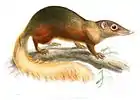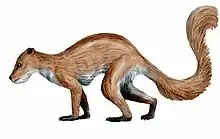Mixodectidae
Mixodectidae (from Greek μιξο, mixo, "mixed", and δεκτες, dektes "biter") is an extinct family of insectivorous placental mammals in the order Dermoptera. The mixodectids originated in the late Cretaceous and survived into the Paleocene in Europe and North America.[2]
| Mixodectidae Temporal range: | |
|---|---|
| Scientific classification | |
| Domain: | Eukaryota |
| Kingdom: | Animalia |
| Phylum: | Chordata |
| Class: | Mammalia |
| Order: | Dermoptera |
| Family: | †Mixodectidae Cope, 1883[1] |
| Genera | |
| |
Description
While there is less anatomical evidence for this group than for other archaic placental families (such as apatemyids, pantolestids, leptictids, and palaeoryctids), preserved dental and cranial anatomies give an idea of mixodectid dietary requirements. Their rodent-like dental pattern was similar to that of the multituberculates, with a pair of large, strong, and forward-directed incisors and a row of multi-cusped and low-crowned premolars and molars — a specialized dental set-up probably used for crushing and opening hard seeds and nuts.[2]
Torrejonian (Middle Paleocene) Mixodectidae had a dental set-up similar to the oldest plagiomenids and are therefore supposedly an ancestral or sister group of the latter. For many years Elipdophorus, the oldest plagiomenid, was classified as Mixodectidae but was finally regarded as more closely related to plagiomenids in the 1970s based on derived dental resemblances. Though the relation between Mixodectidae and other early placental mammals from the "insectivore-primate transition" remain unclear, clearly a number of the archaic mixodectid dental features seem to foreshadow the more derived conditions of plagiomenids. Furthermore, the postcranial skeleton of Mixodectes shows arboreal specialization similar to those of plesiadapids and dermopterans, supporting their inclusion within Euarchonta. [3]
See also
Notes
- Mixodectidae in the Paleobiology Database. Retrieved January 2010.
- Agusti & Anton 2002, p. 5
- Rose 2006, p. 164
References
- Agusti, Jordi; Anton, Mauricio (2002). Mammoths, Sabertooths, and Hominids: 65 Million Years of Mammalian Evolution in Europe. Columbia University Press. ISBN 0-231-11640-3.
- Rose, Kenneth David (2006). The beginning of the age of mammals. JHU Press. ISBN 0-8018-8472-1.
External links
- "Family: Mixodectidae: Occurrence overview". GBIF. Retrieved 16 January 2010.


.jpg.webp)

